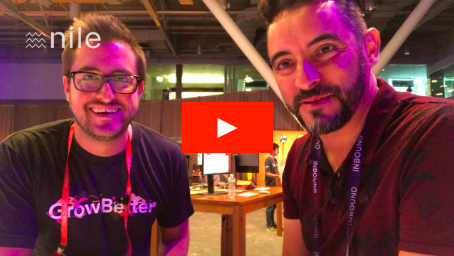How to integrate your different softwares? - Interview with Carlos Martín Martínez from HubSpot
Today, a lot of companies - and especially manufacturing companies - have a lot of different softwares implemented to manage different aspects of their business: ERPs, CRM, accounting software, etc...

What's frustrating is when you don't succeed in integrating these systems together. That's why we went to ask a few questions to the master of integrations at HubSpot: Carlos Martín Martínez, Principal Sales Engineer, and here's what he told us:
1- Adoption is key
When a company needs to integrate a new system, such as a CRM, they might already have something in place - like a legacy-type of architecture - or not. Usually, the people in charge of implementing CRMs start by looking at features to find what's best for their needs.
But to Carlos, that's a mistake. They should be taking care of adoption before anything else :
"Most CRM implementations fail because of a lack of adoption. They fail because the sales representatives, who are the people putting in their data, find it cumbersome, time-consuming and because they do not really get anything out of it."
As higher management deciding on implementing such a software, you cannot expect your sales representatives to take time to put data in a CRM when they are not getting anything out of it. Without adoption, there is no data, and the CRM implementation fails.
As Carlos says it:
"My first recommendation would be to look at a system or platform that is actually designed with the sales representatives in mind, with adoption in mind."
2- Anticipate the integrations you will need
More often than not, businesses have a tendency to forget that the requirements you might have when implementing a new system are bound to evolve. You might not feel the need to have a complex software with an open API today, but you never know what the future holds for you.
As you grow, your needs will change, and you will need to integrate several softwares together. Wouldn't it be a shame to have to start all over again when the time comes?
"You may think that your requirements will stay the same, but they will evolve as you grow. [...] You will need a system that already has preexisting integrations and an open API."
3- HubSpot is here to make your life easier when it comes to integrations
The whole philosophy at HubSpot is based on how they can help their customers even more everyday. They know their customers, and know that they might have other systems and platforms in place other than HubSpot. They know that it is rarely a sinecure to have to create an integration from scratch.
This is why, today, we can see more and more integrations being created within HubSpot, so many I could not even count them all.
"We realized that people might be using other platforms and tools to do something creative and different, and that it might not be a feature that HubSpot offers. [...] All the integrations we have are easy-to-use as you don't need anything technical to connect HubSpot to those platforms."
Thanks for making our lives easier, HubSpot.
4- You will need help
When integrating a big ERP - such as SAP - with HubSpot, please do not try to do it on your own!
As Carlos says:
"The best recommendation I could give is to get help! These systems are complex, they need a lot of maintenance, and there are companies and agencies specialized in integrating HubSpot with these softwares."
As a plus, know that HubSpot offers technical consulting services, which can help you navigating through HubSpot's APIs, and designing this kind of integrations.
If you want to learn more about HubSpot, do not hesitate to watch our demo below (in French).
S’inscrire à la Newsletter
Tous les membres de l'équipe Nile sont des experts marketing et sales pour l'industrie, tous certifiés Hubspot et tous orientés process, data et performance.Notre culture code précise les valeurs dans lesquelles chacun(e) d'entre nous se reconnait. Nous recrutons et manageons sur la base de ce culture code.








